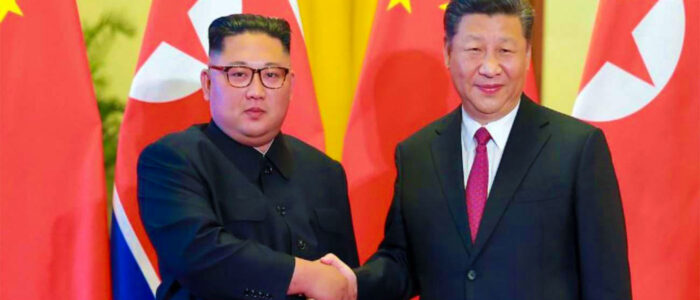
As of November 1, 2024, the diplomatic landscape in Northeast Asia continues to evolve rapidly, with significant new developments in China-North Korea relations. While these two nations share a complex history of strategic alliance and mutual dependence, recent actions by North Korea, including its closer alignment with Russia, have influenced how China approaches its relationship with Pyongyang. Here, we examine the recent dynamics between China and North Korea and consider how these shifts may impact the broader regional stability and diplomatic efforts.
China’s Delicate Balancing Act with North Korea
China and North Korea have historically shared an alliance shaped by political ideology and security interests. However, recent actions by North Korea, particularly its bolstered ties with Russia, have somewhat unsettled China, which now finds itself managing delicate relationships with both its neighbors and adversaries. Kim Jong Un’s recent engagements with Russia, including arms trades and military support agreements, have drawn North Korea closer to Russia. This relationship with Moscow poses a new variable for China, which has traditionally served as North Korea’s primary economic and diplomatic partner.
While China has chosen to overlook certain provocations from North Korea, such as missile tests and recent satellite launches, these moves challenge Beijing’s interests in maintaining peace along its border. Further, China’s diplomatic goal of strengthening regional cooperation with South Korea and Japan is now more complicated by North Korea’s growing assertiveness and defiance against international norms.
Zhao Leji’s Visit to North Korea: A Symbol of Renewed Ties
In April 2024, Zhao Leji, the third-ranking member of the Chinese Communist Party, visited North Korea, marking one of the highest-level Chinese diplomatic missions to the country in recent years. His visit signaled China’s intention to reestablish and reinforce ties with Pyongyang amid global attention on North Korea’s deepening alignment with Russia. Zhao’s visit underscored China’s strategic interest in keeping North Korea as a close partner, even as it balances this relationship with its economic ambitions across the region.
North Korea’s reliance on Chinese trade, estimated to cover over 95% of its total commerce, remains pivotal for Pyongyang’s survival. This economic lifeline affords China substantial influence, although North Korea’s strategic alignment with Russia indicates Pyongyang’s determination to avoid dependence on any single ally. North Korea’s increased collaboration with Russia, particularly regarding arms supplies and technology exchanges, has complicated China’s strategy, as it prefers a stable and controllable North Korea rather than a fiercely independent and nuclear-capable neighbor.
Economic Ties Amid Sanctions and New Trade Protocols
Despite international sanctions, economic cooperation between China and North Korea has persisted, primarily along the North Korea-China border, where goods, labor, and capital flow despite restrictions. North Korea continues to depend on Chinese exports of essential goods, including food and fuel, which have recently become critical for Pyongyang, especially given the pressing need for resources after international isolation and economic struggles.
The recent easing of customs and quarantine protocols along the border highlights China’s attempt to assist North Korea’s economic resilience. North Korean traders now enjoy expedited processes in China, facilitating essential trade in raw materials and products. However, both nations remain cautious in their formal agreements due to scrutiny from the international community, which monitors such exchanges for signs of sanction evasion.
Strategic Concerns for China: The Influence of Russia-North Korea Ties
China’s main concern with the North Korea-Russia partnership is its potential to alter the balance of power in Northeast Asia. As North Korea and Russia exchange weapons, technology, and military support, China faces a more militarized North Korea, one less likely to be responsive to Beijing’s influence. For instance, North Korea’s recent military satellite launch was interpreted as a show of technological might and resistance to both Western pressure and, implicitly, any limitations China might wish to impose.
This military collaboration also impacts China’s relations with South Korea and Japan, countries that are increasingly aligning with the United States for regional security. China, while attempting to stabilize its economy, remains wary of the growing U.S.-Japan-South Korea alliance. Thus, Beijing has urged North Korea to exercise caution, aiming to prevent actions that would lead to further militarization of the region.
Possible Outcomes and Future Directions in China-North Korea Relations
Looking forward, China may continue to extend economic aid and diplomatic support to North Korea while also encouraging Pyongyang to limit its missile tests and other provocative actions that threaten regional stability. Experts suggest that China could attempt to arrange high-level meetings between Kim Jong Un and Xi Jinping to reinforce their alliance, potentially by organizing a visit in the context of the 75th anniversary of their diplomatic relations.
For North Korea, continued support from China remains crucial, even as it seeks to build more alliances, such as with Russia and potentially Iran. In return for China’s support, Pyongyang may align some of its policies with Beijing’s regional objectives, although its recent actions hint at an unwillingness to be entirely influenced by Chinese interests alone.
Conclusion
China-North Korea relations are marked by strategic calculations and mutual dependence, yet they are far from straightforward. As North Korea fortifies its ties with Russia, China faces an increasingly complex regional security scenario. Moving forward, China’s approach will likely involve a blend of cautious support and behind-the-scenes influence to ensure North Korea remains a manageable, if occasionally unpredictable, neighbor.
For further insights on China-North Korea relations and the evolving dynamics in Northeast Asia, visit TheNewsify.
Here are the resources used for the article on China-North Korea relations:
- The Diplomat: This source discusses the intricate balance China maintains with North Korea and the implications of North Korea’s relationship with Russia, emphasizing China’s interests in regional stability and economic cooperation. The Diplomattps://thediplomat.com/2024/04/after-zhao-lejis-visit-whats-next-for-china-north-korea-relations/).
- The Diplomat: Another article elaborating on how the evolving ties between North Korea and Russia complicate ChiThe Diplomats and the broader implications for Northeast Asia’s security landscape. [Explore further here](https://thediplomat.com/2024/06/caught-between-allies-chinas-north-kor​:contentReference[oaicite:2]{index=2}**: This report highlights Zhao Leji’s visit to North Korea and its significance in reinforcing economic and diplomatic ties amidst growing tensions. Find more details here.
These sources provide a comprehensive view of the current state of relations between China and North Korea and their implications for regional security and diplomatic efforts.









Leave a Reply